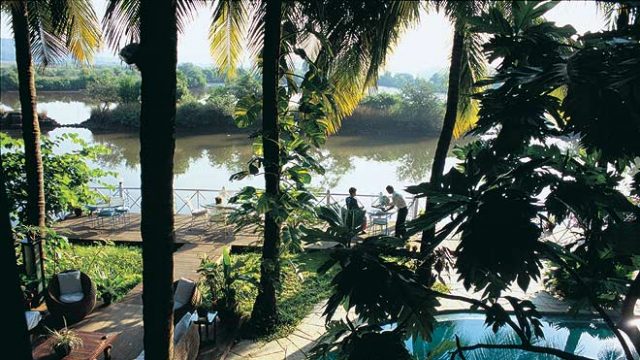Casa Britona is not easy to find. It wasn’t easy to find in the bright blaze of the afternoon, when Madhu and I drove past it once, reversed, and drove past it again; it was even less easier to find in the dark, at two in the morning on our way back from dinner in Candolim. It might have had something to do with us—too much sun, too much drink. It might have had something to do with Casa Britona’s discreet entrance—whitewashed walls, a honey-gold arch and dark-wood door. Though looking again, isn’t that ‘Casa Britona’ spelled out in large capital letters? Guess it was just us. Once through that unassuming entrance, Casa Britona transmogrifies into an extravagant colonial home replete with rococo flourishes.
##310815142712-cb4.jpg##
The notional lobby, really a breakfast room/lounge, has lemon walls, cane-backed chairs, an upright harmonium that looks like a toy harpsichord. On the wall, on panels either side of the harmonium, are large paintings of a small cat and a potted plant. Head through past the glass-fronted double doors and you’re out on the pool-deck. Everywhere you look is cane, wooden loungers, plants, and, in the shade of lanky coconut trees, a small swimming pool glistens wetly like a seal. Beyond the pool is a river, wide and of bovine placidity. Eat lunch here, looking out onto the river and the scrub, and the idea that Panjim is just five kilometres away, that the beaches of North Goa and their sweaty, flabby crowds seems not just absurd but unconscionable. You don’t want to be reminded. An English couple on holiday in Goa for just a week told us they’d been in the hotel three days and had yet to step out, “apart from a short stroll through the village”. Late in the afternoon, they’re still out on the pool deck: he, asleep, his Roddy Doyle discarded, she, sunbathing in the disappearing light.
##310815142428-cb2.jpg##
We go upstairs to our room. Madhu and I are sharing. The bed is a canopied four-poster, several feet off the ground. We agree quickly—one of us is taking the floor. It’s a rule I have: never share a gauzy-curtained four-poster with someone who wears a soul patch. In the end, I get the bed and I feel pretty. Oh so pretty. I feel pretty and witty and, well, gay. A verandah stretches from one end of the house to the other, and every room has a screened-off balcony from which to watch the sun dip into the river. Each of the five rooms at Casa Britona (a suite, two doubles and two singles) is individually, eccentrically designed. There’s the room where the bed is up on the loft, the Japanese room with the screen across which fly painted storks, there’re the patterned tiles, the antique chests, the pink bathroom.
In the morning I meet Sheila Dhody, the Delhi-based exporter behind the Casa hotels (there are two more, in Baga and Anjuna; see listings). She’s wearing white Hilfiger and enormous sunglasses, and her manner is brisk. “You know, I always wanted to start a chain of boutique hotels,” she tells me over fried eggs, “it’s a concept that’s coming of age in India. I scoured the country looking for suitable properties and Goa’s a place I constantly came back to. Parts of the country remain fairly untouched, there are valleys and hills with incredible views. It’s the views, the sheer variety of views that makes Goa so attractive. And then I found this ugly, dilapidated house.”
This house Sheila had found was a warehouse, some three centuries old, on a jetty. She quickly lassoed Dean D’Cruz—Goa’s architect du jour, responsible for designing, among other things, the seminal Nilaya Hermitage—into designing Casa Britona. It took her and D’Cruz two years to refurbish the house. “You should have seen this place when we bought it,” she tells me, “there were no doors, no windows, no nothing.”
##310815142629-cb5.jpg##
Sheila shopped for antiques “everywhere, in Jew Street in Cochin, locally, from Bikaner.” At Casa Britona the evidence of her sprees is all around you: in every imitation Louis XIV chair, every teak coffee table, chandelier, rug and dressing table. There is a boutique at the hotel too, selling “handmade paper from Nepal” and “linen from the convents of the South” (?). The rooms, cluttered with antiques, can occasionally seem chintzy and kitsch but the effect is always endearing. Casa Britona is comfortable, like an overstuffed sofa.
Not that there aren’t problems. The service can be annoyingly slack. At first I put this down to it being Goa, where the climate discourages hurry. Even the language, Portuguese speakers barely bother to enunciate the last syllables, swallowing them up in a listless drawl. It’s historical, even Burton complains in Goa and the Blue Mountains, published in 1851, of sending for a farrier on Monday and having him turn up “if you keep up a running fire of messages… about the next Saturday.” But then I discovered that most of the staff at Casa Britona has been imported from Delhi. Quibbles aside though, Casa Britona offers you a commodity that is increasingly scarce, particularly in a tourist hub like Goa—peace of mind.




